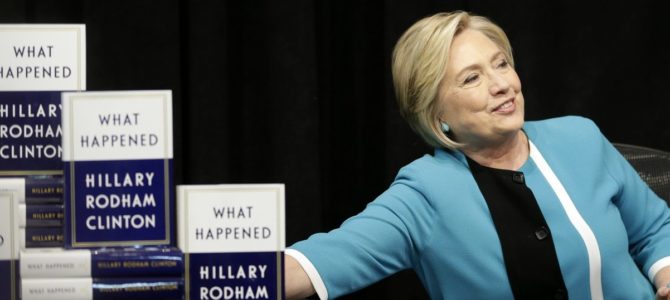
Journalism is in crisis. After some much-needed self-examination, however, reporters are finally beginning to figure out why many Americans are souring on their industry: They’ve been too critical of the Democratic Party.
The trend was evident in 2016, when media outlets decided to focus on Hillary Clinton’s corruption, favor trading, and subsequent cover-up attempts. As any journalism professor could tell you, the purpose of reporting is to answer basic questions, like Who? What? When? Where? Why? And does this story help bolster the chances of the Democratic Party’s candidate or not?
Credit @brianstelter and @amychozick for starting the self-reflection around excessive coverage of Clinton’s emails. https://t.co/tgtN38j6Tk
— Jay Rosen (@jayrosen_nyu) September 17, 2017
So sayeth self-styled journalism ethicist Jay Rosen, and other theorists of the trade like Jeff Jarvis. There was too much reporting going on, they argue. Democracy dies in excessive transparency, apparently. Who is at “fault” for the election of Donald Trump, they ask, as if Clinton had been predestined to wear her crown. And did journalists do enough to propel history in the proper direction?
There is plenty of data available on this question. It’s difficult to believe this now, but at one point a number of top media outlets considered the first-ever FBI investigation of a major presidential candidate in the history of the republic to be somewhat newsworthy. So they proceeded to cover the candidate’s many lies, her purging of somewhere around 30,000 pieces of evidence, and the FBI’s she’s-so-freaking-guilty-but-not-guilty verdict. And when authorities uncovered a computer that should have been in the possession of the FBI but was instead accessible to the sex-addicted husband of a top Hillary aide, they reported that, as well. This should have all been ignored.
On numerous occasions during her book tour, Clinton argued that the press didn’t do its job — which is to say, help her get elected. Considering the sycophantic coverage afforded her and her former boss the past eight years, perhaps these expectations were too high. Perhaps she expected the whitewashing to continue. Perhaps she anticipated the reaction to her dishonesty to be similar to the reaction she received after lying about the events surrounding the September 11, 2012 terror attack that took the life of Christopher Stevens and three other Americans. Which is to say a bunch journalists tweeting,
B
E
N
G
H
A
Z
I
embellished with dismissive jokes.
Perhaps in all the excitement of the election some journalists lost their way.
New York Times reporter Amy Chozick, who covered Clinton during the campaign, admitted to CNN’s Brian Stelter that reporters should probably do some “soul searching” regarding coverage that undermined history’s rightful outcome. The Atlantic’s James Fallows, it seems, agrees with Hillary’s contention that many in the press “can’t bear to face their own role in helping elect Trump.” Fallows’ piece was promoted by Rosen, which was in turn promoted by John Harwood, who covers politics for CNBC.
Harwood, you may recall, was the first-ever Democrat contestant to participate in a Republican primary debate. He was also known for interviewing Jeb Bush with the help of Hillary Clinton’s campaign chairman John Podesta. While all this might sound a tad bit unprofessional to some of you primitive non-journalism-professor types, in the Era of Trump reporters who clear their work with Democratic Party officials aren’t reprimanded, they’re promoted to a lofty position at The New York Times.
In any event, Harwood claims “there is no doubt media coverage exaggerated the significance of Clinton’s e-mails in a way that was not just dumb but obviously ridiculous,” and goes on to claim that the classified documents were nothing more than “leakage.” All of which offers us a teachable moment.
This is how hyper-reporting undermines the yeoman’s work of folks like Harwood. If it hadn’t been for some overeager journalist, we might not know that then-FBI director James Comey believed any “reasonable person” would have known that her server was not an appropriate venue for classified emails. We may not have known that Clinton sent 110 emails containing clearly marked classified information; that 36 of them contained secret information; that eight of those email chains contained “top secret” information. We might not know that the FBI believed “hostile actors” could have “gained access to Secretary Clinton’s personal e-mail account.” Without The New York Times, we might not have known that this was almost surely true.
The correct way to report on Hillary Clinton is simultaneously treating her like the most competent woman who ever lived but also one who can be easily overwhelmed by emails and simple markings on classified documents. Hillary is not corrupt, her peccadillos are nothing to get too excited about. As Harwood puts it, she was “foolish/selfish.” Nothing more. Any other framing of Democrats is liable to get the wrong person elected. Then we have to spend years retroactively delegitimizing the election.
For those of you who reported the news in 2016, now is the time to confess your sins and ask for absolution. May Hillary take pity on your souls.









